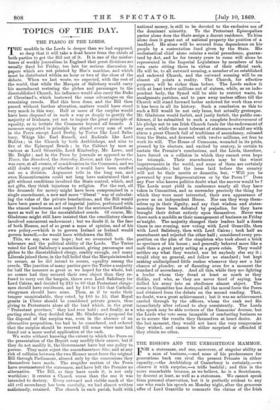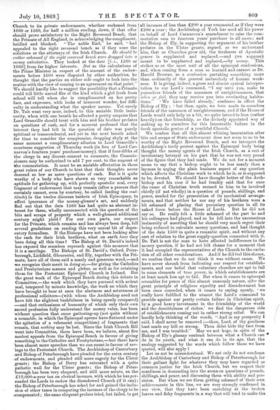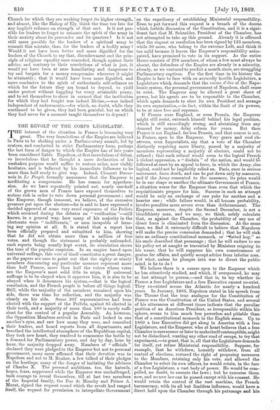THE BISHOPS AND THE UNRIGHTEOUS MAMMON.
FOR a statesman, and one, moreover, of singular ability as a man of business,—and none of his predecessors for generations back can rival the present Primate in either capacity,—the Archbishop of Canterbury is certainly,—we observe it with surprise,—a trifle bashful ; and this is the more remarkable because, as we believe, he is a Scotchman, by descent at least, as well as a statesman. We cannot speak from personal observation, but it is perfectly evident to any one who reads his speech on Monday night, after the generous offer of Lord Granville to commute the claims of the Irish Church to its private endowments, whether reckoned from 1660 or 1560, for half a million sterling, down, if that offer should prove satisfactory to the Right Reverend Bench, that the Primate of All England, in acknowledging the compliment, bridled and blushed. "The noble Earl," he said, "had appealed to the right reverend bench as if they were the solicitors or the attorneys of the Irish Church. He should be rather ashamed if the right reverend bench were dragged into a money calculation. They looked at the date U. e., 1560 or 1660] from far higher interests. But as the calculations of the Prime Minister in respect of the amount of the endow- ments before 1660 were disputed by other authorities, he thought that the parties on either side ought to look into the matter with the view of coming to an agreement on that point." We should hardly like to suggest the possibility that a Primate could tell little unreal fibs of the kind which a girl fresh from .school will tell when she is complimented on her pretty face, and expresses, with looks of innocent wonder, her diffi- culty in understanding what the speaker means. Yet surely Dr. Tait went very near, indeed, to this amiable little insin- cerity, when with one breath he affected a pretty surprise that Lord Granville should treat with him and his brother prelates on questions of cash, and for a moment professed that the interest they had felt in the question of date was purely spiritual or transcendental, and yet in the next breath asked for time to consider the compromise, dropping shyly at the same moment a complimentary allusion to Lord Granville's courteous suggestion of Thursday week (in lieu of Lord Car- narvon's fourteen years' purchase-money), that if four-fifths of the clergy in any diocese consent to commute, the Commis- sioners may be authorized to add 7 per cent. to the amount of he commutation. It must be an amiable affectation in these great rulers of our Church to hint that their thoughts never descend so low as mere questions of cash. But is it quite worthy of a body who have shown so very remarkable an aptitude for gathering up, with perfectly apostolic zeal, every fragment of endowment that may remain (after a process that certainly cannot, even by courtesy, be called feeding the mul- -titude) in the twelve diocesan baskets of Irish Episcopacy, to affect ignorance of the money-gleaner's art, and suddenly find out that the date 1560 has had quite an abstract in- terest for them, wholly unconnected with the question of the bits and scraps of property which a well-gleaned additional 'century might yield For our own parts, our respect for the Primate, which remains and has always been deep, fell several gradations on reading this very unreal bit of depre- catory formalism. If the Bishops have not been looking after the cash for their Irish brethren, what on earth have they been doing all this time? The Bishop of St. David's indeed has exposed the senseless reproach against this measure that it is a sacrilege. The Bishops of St. David's, Oxford, Peter- borough, Lichfield, Gloucester, and Ely, together with the Pri- mate, have all of them said a manly and generous word,—and 'we recognize their merit in doing so,—for giving the Catholics and Presbyterians manses and glebes, as well as for retaining them for the Protestant Episcopal Church in Ireland. But "the great work of the Episcopal Bench during this debate in Committee,—the work which they have pursued with ardent zeal, tempered by minute knowledge, the work on which they 'bave brought to bear at once the alertness and astuteness of professional solicitors—(with whom the Archbishop need not )iave felt the slightest bashfulness in being openly compared) —and that enthusiasm of humanity of which only their own sacred profession fully understand the money value, has been -without question that same gathering-up (not quite without a scramble, in which the Episcopal aprons have fluttered under 'the agitation of a vehement competition) of fragments that :remain, that nothing may be lost. Since the Irish Church Bill -went into Committee, there have been, we believe, about five modest appeals from the Episcopal Bench in favour of giving something to the Catholics and Presbyterians,—but there have 'been almost more speeches than we can count in favour of sav- ings to the Protestant Church. The Archbishop of Canterbury .and Bishop of Peterborough have pleaded for the extra century of endowments, and pleaded still more eagerly for the Ulster ,.grants; the Bishop of Derry has entreated with a quite pathetic wail for the Ulster grants ; the Bishop of Peter- 'borough has been very eloquent, and still more astute, on the £19,000-a-year tax on clerical incomes, with which he has per- suaded the Lords to endow the disendowed Church (if it can) ; 'the Bishop of Peterborough has asked for and gained the inclu- sion of other taxes in computing the incomes of the clergy to be (compensated; the same eloquent prelate tried, but failed, to get
all incomes of less than £200 a year commuted as if they were £200 a year ; the Archbishop of York has used all his power on behalf of Lord Carnarvon's amendment to raise the com- mutation sum to fourteen years' purchase in all cases ; and the Bishop of Ely, in supporting the argument of his brother prelates on the Ulster grants, argued, as we understand him, that as Churches grow old, the freshness of Apostolic graces is supplanted and replaced,—and (we suppose) meant to be supplanted and replaced,—by money. This strikes us as the most naïf of all the episcopal confessions, and, when coming from a man so learned and earnest as Dr. Harold Browne, as a confession partaking something more than ordinarily of the general melancholy of human weak- ness. It is giving, indeed, a gross and almost cynical interpre- tation to our Lord's command, "I say unto you, make to yourselves friends of the mammon of unrighteousness, that when ye fail, they may receive you into everlasting habita- tions." We have failed already,' confesses in effect the Bishop of Ely ; but then, again, we have made to ourselves friends of the mammon of unrighteousness, and if the House of Lords would only help us a bit, we quite intend to lean (rather heavily) on that friendship, as the divinely appointed way of making up to ourselves for this lamentable failure in the fresh apostolic genius of a youthful Church.'
We confess that all this almost whining lamentation after bits and scraps of State endowment does not seem to us to be worthy of the Right Reverend Bench, and we interpret the Archbishop's tardy protest against the Episcopal body being thought the money agents of the Irish Church, as a sort of involuntary betrayal on his part that he was not very proud of the figure that they had made. We do not for a moment mean to say that a bishop ought to be less manly than a layman in urging the plain business aspect of any question which affects the Christian work to which he is, or is supposed to be, devoted. We should have thought better of the Arch- bishop and his case if he had frankly said that for once the cause of Christian truth seemed to him to be involved chiefly (if not wholly) in a question of pounds, shillings, and pence, needed for the prosecution of its mechanical arrange- ments, and that neither he nor any of his brethren were a bit ashamed of placing that pecuniary question in all its naked force before the House of Lords. But he did not say so. He really felt a little ashamed of the part he and his colleagues had played, and so he fell into the unconscious insincerity of asserting that he should very much regret their being reduced to calculate money questions, and had thought of the date 1560 in quite a romantic spirit, and without any sort of relation to the great supply-question connected with it. Dr. Tait is not the man to have affected indifference to the money question, if he had not felt shame for a moment that it had occupied the representatives of the Church to the exclu- sion of all other considerations. And if he did feel this shame, we confess that we do not think it was without cause. We have never shrunk from indicating our respect for establish- ments, and our belief that voluntary churches are apt to fail in some elements of true power, in which establishments are at least much less apt to fail. But when it comes to episcopal scrambles for pence of this almost unseemly nature, after the great principle of religious equality and disendowment has been once conceded, when it comes to saying openly, we really have fulfilled to the utmost the Lord's command to provide against our pretty certain failure in Christian spirit, by a good heavy investment in the friendship of the world and the deceitfulness of riches,' we find the dangerous side of establishments coming out in rather strong relief. We can hardly help thinking of the words, "And in my prosperity I said, I shall never be removed ;—thou, Lord, of thy goodness haat made my hill so strong. Thou didst hide thy face from me, and I was troubled." May we not hope, in spite of the Bishop of Ely's gloomy contrast between what a Church can • do in its youth, and what it can do in its age, that the analogy suggested by the words which follow those we have quoted, will also apply
Let us not be misunderstood. We not only do not condemn the Archbishop of Canterbury and Bishop of Peterborough for their gallant fight for whatever they may have regarded as common justice for the Irish Church, but we respect their manliness in descending into the arena on questions of pounds, shillings, and pence, and discussing them with ability and pre- cision. But when we see them getting ashamed of their own achievements in this line, we are very strongly confirmed in our view, that they hays been snatching at the broken loaves and fishy fragments in a way that will tend to make the Church for which they are working forget its higher strength, and almost, like the Bishop of Ely, think the time too late for any implicit reliance on strength of that sort. Is it not pos- sible for leaders to forget to animate the spirit of the army in their anxiety about its provender and its quarters ? Is it not still more possible for the leaders of a spiritual army to commit this mistake, than for the leaders of a bodily army ? Would it not have been better and more dignified for the leaders of the Church to say that, disendowment and the prin- ciple of religious equality once conceded, though against their advice, and contrary to their convictions of what is just, it would yet have been at once humiliating and dangerous to try and bargain for a money compromise wherever it might be attainable ; that it would have been more dignified, and more conducive to the spirit of enthusiastic self-reliance on which for the future they are bound to depend, to yield under protest without haggling for every attainable penny, and to set themselves to show in earnest that the institution for which they had fought was indeed Divine,—was indeed independent of endowments,—for which, no doubt, while they continued to be given, they had been grateful, but on which they had never for a moment taught themselves to depend ?
































 Previous page
Previous page